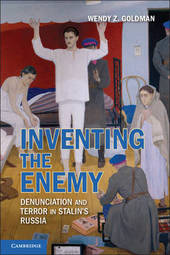
|
Inventing the Enemy: Denunciation and Terror in Stalin's Russia
Paperback / softback
Main Details
| Title |
Inventing the Enemy: Denunciation and Terror in Stalin's Russia
|
| Authors and Contributors |
By (author) Wendy Z. Goldman
|
| Physical Properties |
| Format:Paperback / softback | | Pages:334 | | Dimensions(mm): Height 226,Width 152 |
|
| ISBN/Barcode |
9780521145626
|
| Classifications | Dewey:947.0842 |
|---|
| Audience | | Professional & Vocational | |
|---|
| Illustrations |
Worked examples or Exercises
|
|
Publishing Details |
| Publisher |
Cambridge University Press
|
| Imprint |
Cambridge University Press
|
| Publication Date |
8 August 2011 |
| Publication Country |
United Kingdom
|
Description
Inventing the Enemy uses stories of personal relationships to explore the behaviour of ordinary people during Stalin's terror. Communist Party leaders strongly encouraged ordinary citizens and party members to 'unmask the hidden enemy' and people responded by flooding the secret police and local authorities with accusations. By 1937, every workplace was convulsed by hyper-vigilance, intense suspicion and the hunt for hidden enemies. Spouses, co-workers, friends and relatives disavowed and denounced each other. People confronted hideous dilemmas. Forced to lie to protect loved ones, they struggled to reconcile political imperatives and personal loyalties. Workplaces were turned into snake pits. The strategies that people used to protect themselves - naming names, pre-emptive denunciations, and shifting blame - all helped to spread the terror. Inventing the Enemy, a history of the terror in five Moscow factories, explores personal relationships and individual behaviour within a pervasive political culture of 'enemy hunting'.
Author Biography
Wendy Z. Goldman is Professor in the Department of History at Carnegie Mellon University. She has contributed articles to numerous edited collections and journals, including Slavic Review and the American Historical Review. She is also the author of several books, including Terror and Democracy in the Age of Stalin: The Social Dynamics of Repression (Cambridge University Press, 2007), Women at the Gates: Gender and Industry in Stalin's Russia (Cambridge University Press, 2002) and Women, the State and Revolution: Soviet Family Policy in Social Life, 1917-1936 (Cambridge University Press, 1993).
Reviews'... essential reading for understanding crucial questions about different levels of responsibility during the Great Terror and how it was not only the Soviet elite, but groups of ordinary people, who actively engaged in their own destruction.' Peter Whitewood, Slavonic and East European Review
|